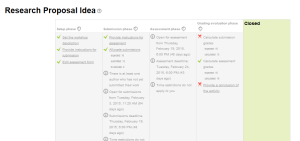Dr. Eric Bauer uses Moodle to simplify the peer review process
 For years, Dr. Eric Bauer of the biology department has had students peer-review term papers and lab reports, and struggled to find an effective way to send papers back and forth. What he didn’t know was a solution was right in front of him. With the help of Moodle’s workshop tool, Dr. Bauer has made the process easier and more effective for himself and his students.
For years, Dr. Eric Bauer of the biology department has had students peer-review term papers and lab reports, and struggled to find an effective way to send papers back and forth. What he didn’t know was a solution was right in front of him. With the help of Moodle’s workshop tool, Dr. Bauer has made the process easier and more effective for himself and his students.
Streamlining the review process
Before discovering the workshop tool, Dr. Bauer primarily used email. However, he found the constant coming-and-going of emailing disorganized and unproductive. Through the Moodle tool, the process has been simplified.
“It seemed like a way to streamline writing assignments,” Dr. Bauer said. “I had students email me writing assignments years leading up to [the change to Moodle workshop], and it was such a pain get [student feedback] out of the attachments and manage them. It was harder to tell who had what submitted where and when.”
The tool starts working just as any submission would on Moodle. By the due date, students upload their document for submission by copy and pasting the essay into the text box or attaching their document from their computer. Then, Moodle randomly selects which essays will go to which person and lets the students know that the peer-review process can begin.
“Once the activity deadline arrives, the students are automatically notified which papers they’re responsible for grading,” Dr. Bauer said. “Also, when they go back to Moodle, they’ll have three papers with the names stripped off.”
The students grade by the criteria Dr. Bauer sets, which he can change with any given assignment. Once their grades and comments put into Moodle, students will submit and Dr. Bauer will receive a notification.
“When they’re done scoring, they submit and grades are dumped into Moodle system,” Dr. Bauer said. “I can then read the paper and submit my grades. I tally all the different scores and give each student one final score.”
Limitations of Moodle workshop
While Dr. Bauer appreciates how Moodle’s workshop tool has simplified the peer review process, he acknowledges that the tool could simplify its set-up process.
“The workflow in setting it up and then working through each phase is really cumbersome and non-intuitive,” Dr. Bauer said. “I’ve tried teaching it to two members of my department and in the end, the only way they could set up a workshop in a timely fashion was for them to copy one of my already-existing workshops and just tweak it.”
Dr. Bauer also wishes he could change the grading from actual numbers to simple complete/incomplete, which he tends to favor more. Aside from that, Dr. Bauer’s recommendation would want more anonymity of the grading system.
“It would be nice if the system was ‘double-blind,’” Dr. Bauer said. “The students already can’t see who assessed them, but it would be even better if they also couldn’t see who they were assessing. On that topic, it would be nice if my assessments were marked as coming from me. The instructor’s assessments should be made obvious to the students.”
Feedback from students is more valuable
Dr. Bauer has been doing peer-review, both with and without Moodle workshop, for years, and yet he is still surprised at how his students tend to grade their peers.
“[Their grading] is not what I thought it would be,” Dr. Bauer said. “Students are far more critical, and they grade harder than I do. Part of this grading is the written feedback. I don’t mandate that they write comments, but they do and the comments are blunt.”
Despite the harsh critiques, Dr. Bauer thinks the peer-review process is worthwhile, especially because lab reports and term papers have to be written a certain way. He believes that the student feedback teaches students how to write correctly and challenges them to improve their writing skills.
“I think students pay attention to what other students think of them more than what their professor thinks of them,” Dr. Bauer said. For one fellow student to say you have very good work hits home a little bit more. For struggling students, reading through work from other students lets them see how they need to do the assignment well.”
Advice for others
After working with Moodle workshop, Dr. Bauer has learned a trick or two about the tool. He would suggest leaving plenty of time to program the tool to your specific needs.
Also, Dr. Bauer advises using the tool for the simplest assignments with clearly set guidelines.
“The workshop is best used for short assignments—one page or less—or sections of larger assignments,” Dr. Bauer said. “Also, be aware of how much work you are asking the students to do during the assessment process. Keep the number of criteria under seven or eight. Very clearly spell out in the criteria what is worthy of each score. In other words, you have to have a clear rubric that the peer reviewers have access to.”
How do you manage peer reviews in your courses? What are your experiences with Moodle’s workshop tool? Let us know in the comments below.
Contact TLT@elon.edu to schedule a consultation to learn more about Moodle’s workshop tool.
Image via Flikr user AJC ajcann.wordpress.com/CC BY-SA 2.0

 Follow
Follow

